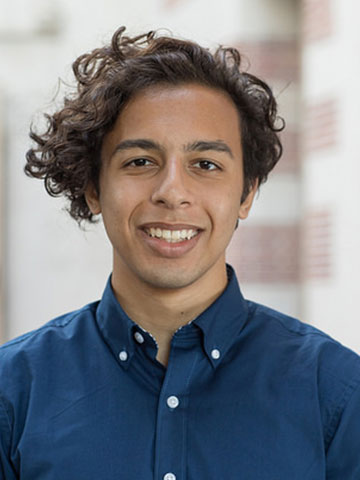
Aly Tantawy – New York, NY
UNIVERSITY OF CHICAGO
The first two days Aly Tantawy visited the University of Chicago, as a high school senior, he was not necessarily convinced it was for him. But on day three, he heard David Axelrod, the former senior advisor to President Barack Obama, and a senior fellow at the University of Chicago’s Harris School of Public Policy, give a talk. Tantawy vividly remembers Axelrod saying how most people just want affirmation for their own viewpoints, instead of being challenged — and how the University of Chicago was different. “No topic is off limits,” says Tantawy. “That’s ultimately why I chose it.”
Tantawy’s hunch panned out. Now that he’s a freshman on campus, studying Public Policy with an emphasis in economics, he finds himself in provocative lunchtime discussions on topics that might be taboo elsewhere — abortion rights, free will, incest, government intrusion, just to name a few. These are not stereotypical rants and tirades, but intellectual exercises. It’s exactly the kind of higher education Tantawy craved — and a change from the culture of his rigorous high school back in Queens, New York.
“You have to unlearn a lot of the things you learn in high school,” says Tantawy, referring to the “plug-and-chug” mentality when it came to calculus equations, or formulaic approaches to writing essays. Now, the proofs and the writing are his to decide.
“Everything here is up to you. Go to class, don’t go to class. Join extracurriculars, don’t join,” he explains. “In high school, there’s a lot of pressure — there’s pressure on yourself, there’s pressure to play a sport, join the newspaper, debate, where the end goal is college. Here, nobody cares what you got on a test. It’s more that people have their passion — they’re doing their own thing.”
Tantawy says the Bovard Scholars program was a huge catalyst in helping him embrace that kind of independence. “Being in the program gives you more confidence in college,” he says. “You did it once for three weeks, now do it for four years — live alone, manage your feelings, manage your time.” He also appreciated getting a new perspective of his college-bound peers — not just based on race or socioeconomic status, which he experienced in high school, but a true diversity of experiences and opinions.
“I always wanted to do big things,” says Tantawy. And even just weeks into his college experience, he feels he’s well on his way.


